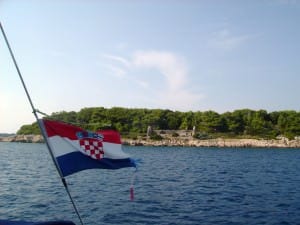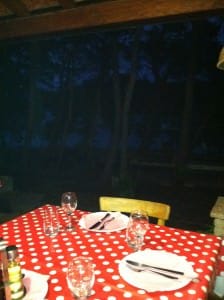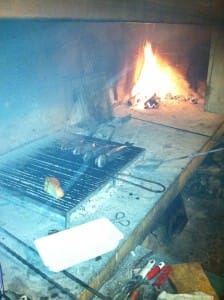 This blog is about ASA’s 2012 Croatia Flotilla. Dubrovnik to Split, September 2012.
This blog is about ASA’s 2012 Croatia Flotilla. Dubrovnik to Split, September 2012.
“Every fish should swim three times,” goes a Croatian saying. “First in the sea, then in olive oil, and finally in wine.” The residents of the Dalmatian Coast live by this creed, and their cuisine, a divine fusion of Italian and Greek styles, demonstrates why.
Of all the delicious repasts we ate during the 2012 Croatia flotilla (and there were many), one stands out in my memory, not only as a meal, but as a unique experience that you can only get while sailing.
It began, as so many sailor tales do, with foul weather. We had made a long and exhilarating crossing through spitting rain and heavy seas from the island of Vis toward a town called Milna, where we planned to get a berth in the marina, take a long, hot shower, and open a few bottles of well-deserved local wine. But Neptune had other ideas–the storm had forced so many boats to Milna that the marina was entirely full, and a long string of boats was being turned away. We needed a new course of action, and with nightfall coming, we needed it fast.
I regret that I never set foot in Milna, which is supposed to be a lovely place, but where one door closes, another opens. Jean de Keyser, our skipper and flotilla leader, studied the chart and located a deep, sheltered inlet a few miles away. What a stroke of luck that turned out to be. When we arrived, the rain had abated and there were a number of mooring balls available, which immediately made our lives easier. There was also a young guy fishing from a small skiff. We didn’t know it yet, but this was Leo, and he was catching our dinner.
It was a beautiful, serene little cove of wooded hillsides, but there was nothing there, virtually no sign of civilization, except for a few stone shacks on the hillside, and a sign advertising a restaurant called “Smrceva.” No one traveling by ferry, tour bus, rental car, or even on foot would be likely to find this place. The only reliable access was by sailboat. I was skeptical, but what choice did we have? It was time to dinghy ashore and try our luck.

This turned out to be the best decision we made in the entire trip. As the only diners, we were greeted by a young man named Neno and seated in an open stone shelter with a view of the bay through pine trees. It was not a refined place. There was junk piled in the corners, and a family of kittens living in the disused fireplace. Neno explained that they had no menu–they would cook whatever was available and bring it to us one course after another, along with some local brandies and as many liters of wine as we could handle. “Okay,” we said, “bring it on.”
It began with baked scallops on the half-shell, and just kept coming: Risotto, grilled calamari, sauteed potatoes, and finally, the piece de resistance, the grilled fish that Leo had been busily catching when we sailed in. The fish had swum in the sea, it had swum in olive oil, and now it was time for that third and final voyage.

When the meal was over, Neno invited us into the nearby home to see their massive collection of family artifacts. He told us that Marino, the owner, had been a famous soccer star for Yugoslavia in the 1970s, and showed us pictures of him lining up to play Germany and shaking hands with Yugoslavian president Tito. (As he was talking, we could see Marino bustling around outside, keeping the place in order.) They even had us watch TV with them for a few minutes. The local Croatian news was on, and with minimal English they tried to explain the headlines to us through mime. I don’t think any of us understood much, but we appreciated the effort anyway.
It was pitch black as we returned to the dinghy dock, Neno lighting the way with a series of hand lanterns. By the time we were back on board, it was clear to everyone that things had worked out exactly right, and we had just had one of those special experiences available only to the cruising sailor. That’s the adventure of a flotilla–you have a plan, but when circumstances change, and you are forced to improvise, that’s when some of the greatest discoveries are made.













